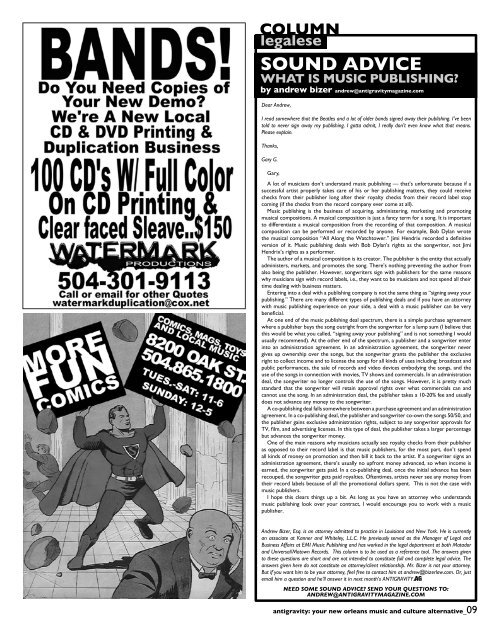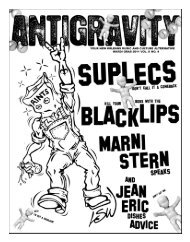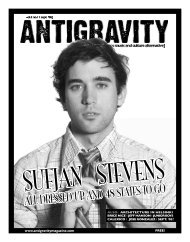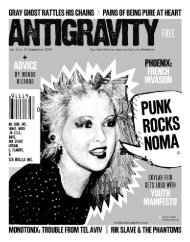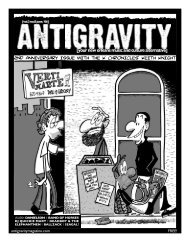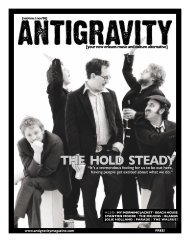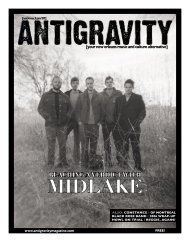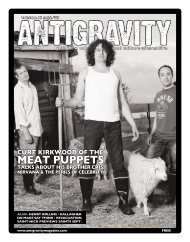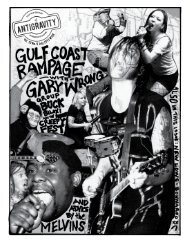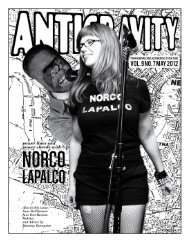COLUMNsportsSAINT NICKRELEASING HORN A GOOD MOVEby nicholas simmons simmons@antigravitymagazine.comThis column is around for one reason: ANTIGRAVITY thinks the thing that’s missing fromlocal print coverage of the Saints is old fashioned, biased opinion. If they make a great move,the team will be lauded. If they screw up, they’ll get trashed. Each month I’ll tackle (get it?)the hot button issues surrounding the team and try to shed some light on them, all from a fan’sperspective. When the season comes around and we’re all back in the ‘Dome, feel free to pass bysection 634, row 18 and say “Hi” (or, “Eff off!, if that’s what pleases you). On with the show...JOE HORN RELEASED, SIGNS WITH ATLANTA.The Saints released Joe Horn on Thursday, March 1st and on the 8th he was introduced as a(hated) Atlanta Falcon. Let’s get something out of the way: The Saints made the right move inreleasing the 35-year-old Horn. Take some simple stats as evidence. In his first five years in NewOrleans, Horn averaged 87 catches for 1257 yards and 9 TDs while missing just two regularseason games and being voted to four Pro Bowls. Those are definitely numbers befitting a topflightNFL receiver. Now, over the past two years Horn has averaged just 43 catches for 666 yardsand 2.5 TDs while missing nine regular season games and being voted to zero Pro Bowls. Horn isclearly on the backside of his career and in retrospect the Saints were wrong in giving in to his lastcontract demand, a five-year extension he signed before the 2005 season that would have paid hima total of $42 million. Previous to that, in 2003, Horn had threatened to hold out before signinga three-year extension. Again, Horn was putting up top-flight numbers and showed little sign ofbreaking down, so we can’t slam the front office that badly, though they did screw up.Here’s the problem. When Horn put up the great numbers he twice demanded a new contractand twice received lucrative extensions, but as soon as his stats drastically dropped and the teamwanted his pay to fit those numbers, Horn balked. After the Saints lost the NFC Championshipgame, Horn was interviewed in the locker room. Asked what his response would be if the teamasked him to take a cut in pay, Horn said (and I’m paraphrasing, except for the first word), “No. IfI have to put on another helmet and continue my career with another team, I will.” What a teamplayer. Nonetheless, his scheduled <strong>2007</strong> salary of $4.45 million with a $1 million roster bonusisn’t worth another under-50 catches with under-700 yards kind of season. Horn played brilliantlyduring in his first five years as a Saint, but age and injuries crept in and Horn refused to buy in tothe notion that he’d be better off as a slightly less rich but much beloved Saint than an equally lessrich, much hated Falcon. For that, I will never forgive Joe Horn. You won’t go down in the annalsof Saints history as an Archie Manning, Morten Andersen, Rickey Jackson or a Sam Mills. Theywere all Saints who were genuinely jilted by the team. They all had great years left in them andthe Saints simply dropped the ball in their situations. Instead, Joe Horn will go down as a greedy,me-first guy who simply gave us a few good years. Joe, we’d have preferred you be over the hillwith us, but thems the breaks.What really riles me, though, is how Joe’s being two-faced. After Horn was released it wasrevealed that his agent and the Saints negotiated for two days in an attempt to keep him in NewOrleans. In fact, he was quoted as saying that he “wanted to retire as a Saint,” but that he didn’tthink coach Sean Payton wanted him back. “Payton wanted to prove he could win without JoeHorn.” Really, Joe? Why backtrack on your earlier statement that you wouldn’t take a pay cutunless you realized your contract exceeded your value? Why would the team negotiate with youfor two days if Payton didn’t want you? What would they have done if you accepted the newcontract? Say “Wait, really? Nevermind!” and suddenly pull it off the table?To fully prove that Horn has an inflated opinion of his worth, here’s a quote taken from theESPN article on his introductory press conference in Atlanta: “Horn believes Marques Colston,a seventh-round draft choice last year, and wideouts Devery Henderson, Donte’ Stallworth andTerrance Copper benefited from his leadership in recent years.” Now, we’re talking about twoplayers whose 2006 seasons were their first in N.O. (Colston and Copper) and two players who,by all sane reasoning, have underachieved as Saints. Stallworth is in the NFL’s substance abuseprogram and never ever showed the want to do what he had to in order to stay healthy andproductive. Henderson, for whatever reason, hasn’t been able to consistently catch the ball. Hell,if it wasn’t for Copper’s miraculous end-of-the-half TD catch against Atlanta no one would havethought twice about him being a free agent! (Note: Copper re-signed with the team with a one-yearcontract in late March.) It seems to me that whatever influence Horn had on our wideout corps, itwasn’t necessarily good.I wanted Horn back as much as anyone else, but the more I read his comments and learn abouthis attitude, the more I realize: We’re better off without him. His post-K good deeds were greatlyneeded and greatly appreciated, but there have been people with far less means that have donejust as much, if not more. Goodbye, Joe. And good riddance.THINGS TO LOOK FOR IN THE ‘07 DRAFTDraft “mock” experts have the Saints (Currently set to pick 27th in the first round) taking anycornerback available, from Marcus McCauley (Fresno State) to Aaron Ross (Texas). While CB isthe obvious point of weakness for the defense, don’t discount the team addressing another areaif the right player falls to them. Keep an eye out for: TE Greg Olson (Miami) Even with thesigning of Eric Johnson (49ers) to a one-year deal, Drew Brees could use a nice pass-catching TEand the team may want to protect itself if Johnson’s injury problems resurface. WR DwayneBowe (LSU) The team hasn’t been able to find a serviceable WR to replace Horn (local boyBrandon Stokley [Colts] jilted N.O. to sign with Denver), and Bowe is a stronger, more polishedversion of former LSU teammate Devery Henderson, who’s going into the final year of his rookiecontract. DEs Adam Carriker (Nebraska) and Jarvis Moss (Florida) Both of theseplayers expect to go near the middle of the 1st round, but if either falls to 27 don’t be surprised ifthe Saints grab him as a future replacement for Charles Grant, who’s clearly on his way out. 08_antigravity: your new orleans music and culture alternative
COLUMNlegaleseSOUND ADVICEWHAT IS MUSIC PUBLISHING?by andrew bizer andrew@antigravitymagazine.comDear Andrew,I read somewhere that the Beatles and a lot of older bands signed away their publishing. I’ve beentold to never sign away my publishing. I gotta admit, I really don’t even know what that means.Please explain.Thanks,Gary G.Gary,A lot of musicians don’t understand music publishing — that’s unfortunate because if asuccessful artist properly takes care of his or her publishing matters, they could receivechecks from their publisher long after their royalty checks from their record label stopcoming (if the checks from the record company ever come at all).Music publishing is the business of acquiring, administering, marketing and promotingmusical compositions. A musical composition is just a fancy term for a song. It is importantto differentiate a musical composition from the recording of that composition. A musicalcomposition can be performed or recorded by anyone. For example, Bob Dylan wrotethe musical composition “All Along the Watchtower.” Jimi Hendrix recorded a definitiveversion of it. Music publishing deals with Bob Dylan’s rights as the songwriter, not JimiHendrix’s rights as a performer.The author of a musical composition is its creator. The publisher is the entity that actuallyadministers, markets, and promotes the song. There’s nothing preventing the author fromalso being the publisher. However, songwriters sign with publishers for the same reasonswhy musicians sign with record labels, i.e., they want to be musicians and not spend all theirtime dealing with business matters.Entering into a deal with a publishing company is not the same thing as “signing away yourpublishing.” There are many different types of publishing deals and if you have an attorneywith music publishing experience on your side, a deal with a music publisher can be verybeneficial.At one end of the music publishing deal spectrum, there is a simple purchase agreementwhere a publisher buys the song outright from the songwriter for a lump sum (I believe thatthis would be what you called, “signing away your publishing” and is not something I wouldusually recommend). At the other end of the spectrum, a publisher and a songwriter enterinto an administration agreement. In an administration agreement, the songwriter nevergives up ownership over the songs, but the songwriter grants the publisher the exclusiveright to collect income and to license the songs for all kinds of uses including: broadcast andpublic performances, the sale of records and video devices embodying the songs, and theuse of the songs in connection with movies, TV shows and commercials. In an administrationdeal, the songwriter no longer controls the use of the songs. However, it is pretty muchstandard that the songwriter will retain approval rights over what commercials can andcannot use the song. In an administration deal, the publisher takes a 10-20% fee and usuallydoes not advance any money to the songwriter.A co-publishing deal falls somewhere between a purchase agreement and an administrationagreement. In a co-publishing deal, the publisher and songwriter co-own the songs 50/50, andthe publisher gains exclusive administration rights, subject to any songwriter approvals forTV, film, and advertising licenses. In this type of deal, the publisher takes a larger percentagebut advances the songwriter money.One of the main reasons why musicians actually see royalty checks from their publisheras opposed to their record label is that music publishers, for the most part, don’t spendall kinds of money on promotion and then bill it back to the artist. If a songwriter signs anadministration agreement, there’s usually no upfront money advanced, so when income isearned, the songwriter gets paid. In a co-publishing deal, once the initial advance has beenrecouped, the songwriter gets paid royalties. Oftentimes, artists never see any money fromtheir record labels because of all the promotional dollars spent. This is not the case withmusic publishers.I hope this clears things up a bit. As long as you have an attorney who understandsmusic publishing look over your contract, I would encourage you to work with a musicpublisher.Andrew Bizer, Esq. is an attorney admitted to practice in Louisiana and New York. He is currentlyan associate at Kanner and Whiteley, L.L.C. He previously served as the Manager of Legal andBusiness Affairs at EMI Music Publishing and has worked in the legal department at both Matadorand Universal/Motown Records. This column is to be used as a reference tool. The answers givento these questions are short and are not intended to constitute full and complete legal advice. Theanswers given here do not constitute an attorney/client relationship. Mr. Bizer is not your attorney.But if you want him to be your attorney, feel free to contact him at andrew@bizerlaw.com. Or, justemail him a question and he’ll answer it in next month’s ANTIGRAVITY.NEED SOME SOUND ADVICE? SEND YOUR QUESTIONS TO:ANDREW@ANTIGRAVITYMAGAZINE.COMantigravity: your new orleans music and culture alternative_09


